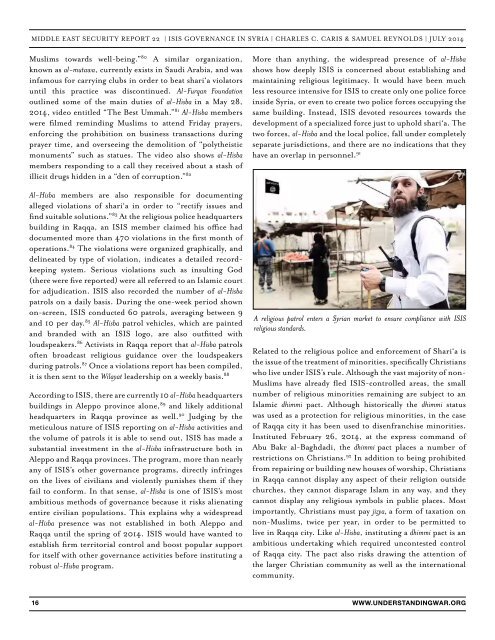ISIS_Governance
ISIS_Governance
ISIS_Governance
Create successful ePaper yourself
Turn your PDF publications into a flip-book with our unique Google optimized e-Paper software.
Middle East Security Report 22 | <strong>ISIS</strong> <strong>Governance</strong> in syria | Charles C. Caris & Samuel Reynolds | july 2014<br />
Muslims towards well-being.” 80 A similar organization,<br />
known as al-mutawa, currently exists in Saudi Arabia, and was<br />
infamous for carrying clubs in order to beat shari‘a violators<br />
until this practice was discontinued. Al-Furqan Foundation<br />
outlined some of the main duties of al-Hisba in a May 28,<br />
2014, video entitled “The Best Ummah.” 81 Al-Hisba members<br />
were filmed reminding Muslims to attend Friday prayers,<br />
enforcing the prohibition on business transactions during<br />
prayer time, and overseeing the demolition of “polytheistic<br />
monuments” such as statues. The video also shows al-Hisba<br />
members responding to a call they received about a stash of<br />
illicit drugs hidden in a “den of corruption.” 82<br />
Al-Hisba members are also responsible for documenting<br />
alleged violations of shari‘a in order to “rectify issues and<br />
find suitable solutions.” 83 At the religious police headquarters<br />
building in Raqqa, an <strong>ISIS</strong> member claimed his office had<br />
documented more than 470 violations in the first month of<br />
operations. 84 The violations were organized graphically, and<br />
delineated by type of violation, indicates a detailed recordkeeping<br />
system. Serious violations such as insulting God<br />
(there were five reported) were all referred to an Islamic court<br />
for adjudication. <strong>ISIS</strong> also recorded the number of al-Hisba<br />
patrols on a daily basis. During the one-week period shown<br />
on-screen, <strong>ISIS</strong> conducted 60 patrols, averaging between 9<br />
and 10 per day. 85 Al-Hisba patrol vehicles, which are painted<br />
and branded with an <strong>ISIS</strong> logo, are also outfitted with<br />
loudspeakers. 86 Activists in Raqqa report that al-Hisba patrols<br />
often broadcast religious guidance over the loudspeakers<br />
during patrols. 87 Once a violations report has been compiled,<br />
it is then sent to the Wilayat leadership on a weekly basis. 88<br />
According to <strong>ISIS</strong>, there are currently 10 al-Hisba headquarters<br />
buildings in Aleppo province alone, 89 and likely additional<br />
headquarters in Raqqa province as well. 90 Judging by the<br />
meticulous nature of <strong>ISIS</strong> reporting on al-Hisba activities and<br />
the volume of patrols it is able to send out, <strong>ISIS</strong> has made a<br />
substantial investment in the al-Hisba infrastructure both in<br />
Aleppo and Raqqa provinces. The program, more than nearly<br />
any of <strong>ISIS</strong>’s other governance programs, directly infringes<br />
on the lives of civilians and violently punishes them if they<br />
fail to conform. In that sense, al-Hisba is one of <strong>ISIS</strong>’s most<br />
ambitious methods of governance because it risks alienating<br />
entire civilian populations. This explains why a widespread<br />
al-Hisba presence was not established in both Aleppo and<br />
Raqqa until the spring of 2014. <strong>ISIS</strong> would have wanted to<br />
establish firm territorial control and boost popular support<br />
for itself with other governance activities before instituting a<br />
robust al-Hisba program.<br />
More than anything, the widespread presence of al-Hisba<br />
shows how deeply <strong>ISIS</strong> is concerned about establishing and<br />
maintaining religious legitimacy. It would have been much<br />
less resource intensive for <strong>ISIS</strong> to create only one police force<br />
inside Syria, or even to create two police forces occupying the<br />
same building. Instead, <strong>ISIS</strong> devoted resources towards the<br />
development of a specialized force just to uphold shari‘a. The<br />
two forces, al-Hisba and the local police, fall under completely<br />
separate jurisdictions, and there are no indications that they<br />
have an overlap in personnel. 91<br />
A religious patrol enters a Syrian market to ensure compliance with <strong>ISIS</strong><br />
religious standards.<br />
Related to the religious police and enforcement of Shari‘a is<br />
the issue of the treatment of minorities, specifically Christians<br />
who live under <strong>ISIS</strong>’s rule. Although the vast majority of non-<br />
Muslims have already fled <strong>ISIS</strong>-controlled areas, the small<br />
number of religious minorities remaining are subject to an<br />
Islamic dhimmi pact. Although historically the dhimmi status<br />
was used as a protection for religious minorities, in the case<br />
of Raqqa city it has been used to disenfranchise minorities.<br />
Instituted February 26, 2014, at the express command of<br />
Abu Bakr al-Baghdadi, the dhimmi pact places a number of<br />
restrictions on Christians. 92 In addition to being prohibited<br />
from repairing or building new houses of worship, Christians<br />
in Raqqa cannot display any aspect of their religion outside<br />
churches, they cannot disparage Islam in any way, and they<br />
cannot display any religious symbols in public places. Most<br />
importantly, Christians must pay jizya, a form of taxation on<br />
non-Muslims, twice per year, in order to be permitted to<br />
live in Raqqa city. Like al-Hisba, instituting a dhimmi pact is an<br />
ambitious undertaking which required uncontested control<br />
of Raqqa city. The pact also risks drawing the attention of<br />
the larger Christian community as well as the international<br />
community.<br />
16 www.Understandingwar.org


